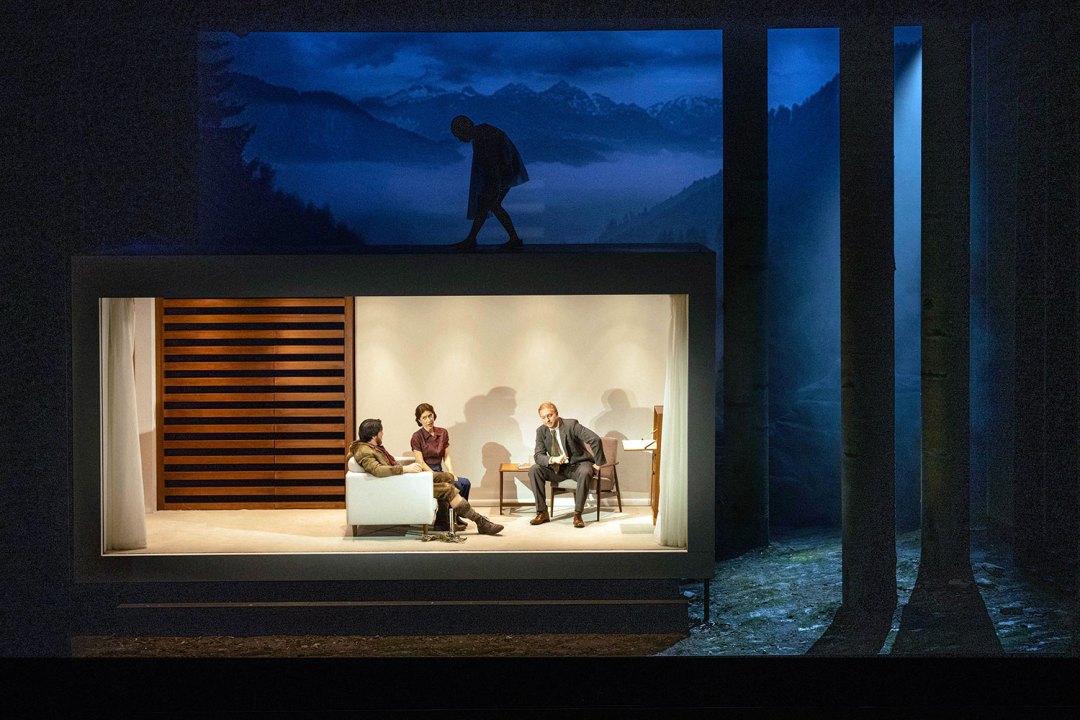When does a new opera enter the repertoire? Judith Weir’s Blond Eckbert has only had a couple of UK productions since its première at English National Opera in 1994, but it’s been doing reasonably good business on the continent, where its source material – a story by German writer Ludwig Tieck – presumably has more cultural currency. In any case, it’s back now, as part of English Touring Opera’s autumn roster, and both the staging (by ETO’s general director Robin Norton-Hale) and the performances deserve to make Weir’s haunted, oddly unsettling opera a lot better known.
If my toes had curled any harder I think I’d have dropped a shoe size
As it should be: this is a small opera that makes a bigger and darker impression each time you see it. It’s now scored for a chamber ensemble and just four singers, and it’s astonishing how much depth and meaning Weir finds in the simplest of sounds – how unerringly she seems to find the soul of each instrument, and the precise amount of space and weight to give to each word of Tieck’s gnomic text. There’s never any sense of strain, or of music trying to carry more drama than it will bear.
Yet somehow Blond Eckbert creates a universe that’s pregnant with meaning: German romanticism in all its wonder, richness and horror. Norton-Hale’s production finds its centre immediately; we see pine-clad mountains and mist swirling through the forest. But Eckbert (Alex Otterburn) and his wife Berthe (Flora McIntosh) are a modern couple in a minimalist home (the designs are by Eleanor Bull) that serves both as shelter and trap. A bird – Aoife Miskelly, singing and moving with bright, knowing alertness – perches on the roof, the only character to address the audience directly. Walther, the outsider whose entrance unravels this idyll, is played by William Morgan, a tenor with earth in his voice and a knack of suggesting the uncanny even when he’s sitting still.
To say much more would risk spoilers. The plot is concise enough, though again, the weight it carries is remarkable and this cast, as well as the conductor Gerry Cornelius, delivers it admirably. Norton-Hale’s direction is an exemplary piece of storytelling, atmospheric, direct and charged – like Weir’s music – with things unsaid.
Blond Eckbert lasts little more than an hour, and it’s preceded by Do not take my story for a fairytale; a short, lightly dramatised recital of songs and arias by C.P.E. Bach, Schubert, Beethoven and their proto-romantic contemporaries. Engaging stuff, stylishly performed by four young singers. But the real adventure comes after the interval.
It’s touring alongside another operatic fairy tale, Rimsky-Korsakov’s The Snowmaiden, directed by Olivia Fuchs and conducted by Hannah Quinn with a reduced orchestration that does a good job of capturing the sweetness and glow of Rimsky’s score (the woodwind writing is particularly toothsome). We don’t hear enough of Rimsky-Korsakov’s operas, and from all the options available (he composed at least 14) The Snowmaiden isn’t the simplest choice. This outwardly magical story has a pay-off that can seem impossibly cruel unless you subscribe to Rimsky’s particular brand of pan-Slavic neo-paganism, which has got to be a niche interest, at best. No matter. Fuchs delivers the story with masterful clarity; the costumes are evocative without being kitschy and the choral and dance scenes are handled with imagination and zest.
As Snowmaiden, Ffion Edwards is intensely touching and her voice was positively pearly. Kitty Whately sang with show-stealing warmth as the village heart-throb (it’s a trouser role) Lel and Edmund Danon brought as much charm as was probably possible to Snowmaiden’s all-too-cancellable suitor Mizgir. Just as 19th-century producers used to tailor Don Giovanni to Victorian sensibilities, Fuchs tweaks Rimsky’s ending to gratify 21st-century assumptions, and our icy heroine ends up thoroughly empowered. You might or might not be convinced, but you’ll have an enjoyable time deciding.
At the Barbican, meanwhile, the BBC Singers celebrated their 100th birthday with an impressive line-up of guests – Anna Lapwood, Abel Selaocoe, Eric Whitacre – and a big buffet-spread of a gala concert. Works by Bach, Whitacre and Shruthi Rajasekar were dispatched with polish (and, in the case of Bernstein’s Chichester Psalms, crackling energy) while Schoenberg’s Friede auf Erden demonstrated what this group (like few others) really can do, when asked.

The subtext of the evening was the Singers’ belated reprieve from the BBC’s philistine (and by all accounts, incompetent) recent plan to axe the group outright. In that context Roderick Williams’s new commission Inform, Educate, Entertain made even more awkward listening than you’d expect from a choral work that literally – and I swear, this is not a storyline from W1A – sets the Corporation’s Royal Charter to music, complete with all the HR boilerplate about diversity and ‘content’. This was peak BBC self-congratulation, though in fairness they were hardly going to sing about Huw Edwards. Williams is a wonderful musician, but if my toes had curled any harder I think I’d have dropped a shoe size.








Comments